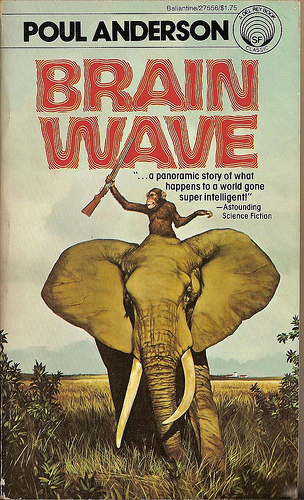Brain Wave: the ur-singularity novel?
#

This year, I checked out Poul Anderson’s out-of-print novel Brain Wave (1954) because I found the idea interesting. The conceit of the novel is that for the last 65 million years the Earth has been traveling through a region of space which has suppressed electrical conduction, thus making brains far less efficient than they would otherwise be (this explains why dinosaurs had such small brains – they didn’t need large ones). When Earth suddenly comes out of the suppression field, the intelligence of every animal on the planet increases by five-fold almost overnight. Normal people become geniuses, geniuses become super-geniuses, and some animals become sentient.
There are a lot of interesting ideas that are explored. Some people can’t handle their new-found super-intelligence, or want to go back to the way things were. Animals realize they’re going to get eaten and won’t cooperate any longer, and no one wants to farm or do menial labor any more. It’s a race against time to keep the human race alive under these circumstances.
The novel is not very good, which is pretty typical of science fiction novels of this period. The characters are flat and the gender roles…wow. The novel is short and seems abbreviated: there are several vignettes that don’t go anywhere (one interesting one is African nationalists conspiring with chimpanzees to throw off colonialists).
However, I thought it was an interesting read because of its similarity with the Vingean singularity novels of 1990-present. Unlike a technological singularity propelled by rapidly accelerating change, this one is of natural origin and it plays out in slow motion as opposed to the “hard rapture” that is usually depicted. But the end result is the same: humans become so intelligent that they become uninterested in Earth and leave the planet to explore the galaxy. The idea of a border between areas of higher and lower intelligence also has obvious parallels with Vernor Vinge’s Zones of Thought. It’s interesting to note that A Deepness in the Sky is dedicated to Poul Anderson.